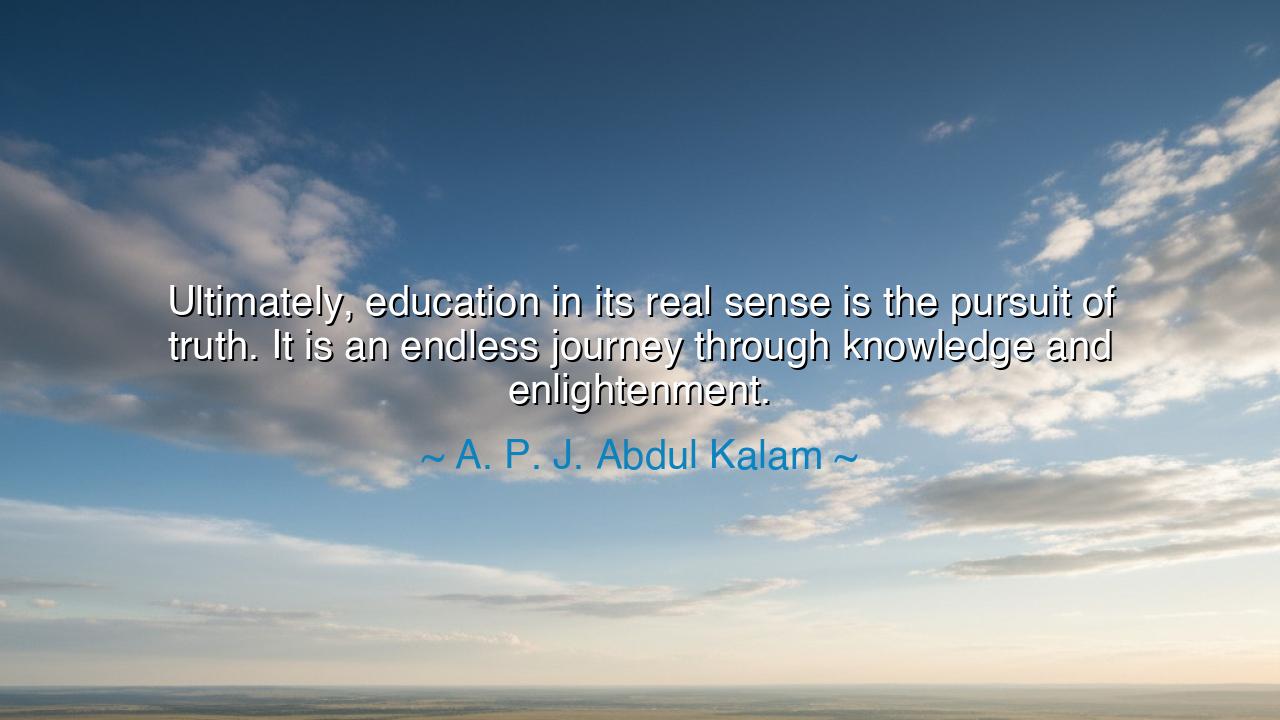
Ultimately, education in its real sense is the pursuit of truth.
Ultimately, education in its real sense is the pursuit of truth. It is an endless journey through knowledge and enlightenment.






The great philosopher-scientist A. P. J. Abdul Kalam, the “People’s President” of India, once declared: “Ultimately, education in its real sense is the pursuit of truth. It is an endless journey through knowledge and enlightenment.” These words are not the echo of a scholar content with books alone, but the testimony of a seeker who walked the path of discovery with humility and fire. In his voice, we hear not the cold logic of academia, but the heartbeat of ancient wisdom — that education is not the filling of the mind with facts, but the awakening of the soul to truth. For truth is not a destination to be conquered, but a horizon forever receding, calling humanity to rise, to learn, and to seek.
In the ancient world, this truth was known to the sages of every civilization. The philosophers of Greece spoke of aletheia, the uncovering of what is hidden. The rishis of India called it satya, the eternal reality that lies beneath illusion. To both, the pursuit of knowledge was sacred work — a lifelong pilgrimage toward understanding the self and the universe. Kalam, shaped by the spirit of science yet nourished by faith, stands in that same lineage. For him, education was not the memorization of formulas, but the purification of perception — the ability to see the divine order within creation. To learn was to draw closer to the truth that binds stars, atoms, and human hearts together.
When he speaks of an “endless journey through knowledge and enlightenment,” he reminds us that learning never ends, for truth itself has no end. The wise never say, “I know enough.” They know only this — that ignorance is vast, and understanding is a light that grows brighter the more it is shared. In the laboratories of science and the temples of thought, every discovery is but a doorway to deeper mystery. Newton, after unveiling the laws of motion, called himself a child collecting shells on the shore of an infinite ocean. Einstein, standing upon that same shore centuries later, said he felt the same wonder. So too did Kalam, who gazed at the stars not only through telescopes, but through the eyes of reverence, knowing that every truth revealed by science was a reflection of something divine.
Consider his own life as a living parable. Born into poverty on the southern coast of India, Abdul Kalam sold newspapers as a boy, yet his spirit burned with curiosity. The winds that swept across the sea carried to him dreams of flight — dreams he would one day transform into reality as he rose to become one of India’s leading aerospace scientists. But even in glory, he remained a humble learner, forever asking questions, forever bowing before the vastness of the unknown. His life was proof that education, when guided by truth and purpose, can lift a man from obscurity to immortality — not through power or wealth, but through the service of knowledge to humanity.
In this light, education is not a privilege for the few, but a responsibility of the soul. It demands more than intellect; it requires integrity, patience, and humility. For truth does not reveal itself to the arrogant. The proud collect facts, but the pure in heart perceive meaning. The journey of enlightenment begins when one learns not only to question the world, but to question oneself. The ancients called this “knowing thyself,” and Kalam, though a man of science, lived it fully — balancing reason with faith, curiosity with compassion.
His words also warn us: when education loses its spirit and becomes a tool for ambition alone, it ceases to be education and becomes mere training. The pursuit of truth demands wisdom, not just information. It asks of us to see knowledge as light — something to illuminate the path of others, not to glorify ourselves. The true scholar, like the true saint, learns in order to serve. For every discovery that does not uplift humanity is a betrayal of enlightenment.
Therefore, let the children of the earth remember this: seek truth, not success. Learn not for the sake of titles, but for the joy of understanding. Let every classroom become a sanctuary, every book a lantern, every question a prayer. The mind must be sharpened, yes — but the heart must be awakened too. As A. P. J. Abdul Kalam taught, the destiny of a nation depends not on its weapons or wealth, but on the wisdom of its people.
And so, let the seeker walk on, humbly and bravely. For the pursuit of truth is the noblest pilgrimage of all — one that never ends, yet ever enlightens. Knowledge without end, light without limit, truth without fear — this is the true education. This is the journey that makes the soul eternal.






AAdministratorAdministrator
Welcome, honored guests. Please leave a comment, we will respond soon